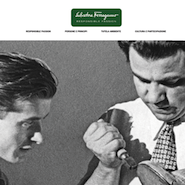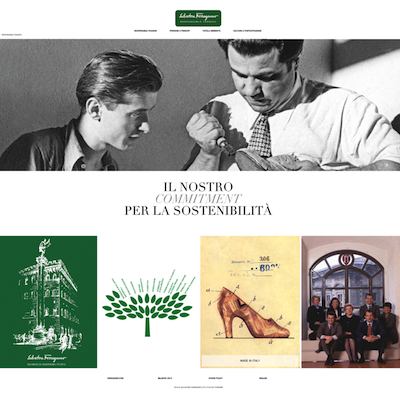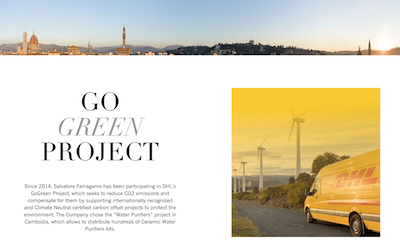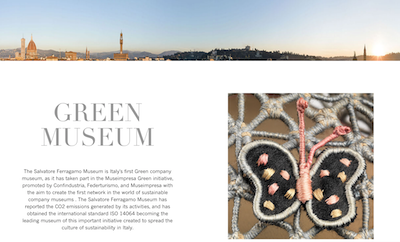 Ferragamo's CSR Web site homepage
Ferragamo's CSR Web site homepage
Italian fashion house Salvatore Ferragamo is upholding its commitment to social obligations with the launch of a new Web site devoted to corporate social responsibility.
The launch of the CSR Web site comes right as the Museo Salvatore Ferragamo in Florence, Italy was named the first sustainable corporate museum by the country’s government, showing that the brand’s commitments extend to all facets of its business. Transparency is becoming more synonymous with luxury as brands work to show that products are ethically sourced and practices are both environmentally and socially conscious for the benefit of the community and employees.
"Today's global luxury consumers have embraced social and environmental responsibility as an everyday expectation, not just for companies but also as a personal undertaking, because they see the power they have to make a difference through their choices, from products they buy to the places they work," said Diana Verde Nieto, co-founder of Positive Luxury, London.
"Therefore, it's more important than ever for companies to not just share their CSR efforts, but continually update their current and potential consumers on their actions in this area, in order to gain trust and retain loyalty long term," she said.
Ms. Verde Nieto is not affiliated with Ferragamo, but agreed to comment as an industry expert.
Ferragamo was unable to comment directly.
Sustainable status
The Ferragamo CSR Web site gives consumers, as well as the company's shareholders, an outlet in which they can explore how the brand has made social responsibility a central aspect of its decision-making process.
Ferragamo’s primary CRS pillars include promoting “Made in Italy” principles, protecting the environment, valuing its people and maintaining a relationship with the local community and culture.
Through the “Responsible Passion” tab, consumers are given a brief overview of Ferragamo’s CSR principles including its cross-functional working group Green Team established in 2014 to design and promote corporate responsibility efforts, its commitment to Italian craftsmanship and the ethical principles that guide the brand.
Ferragamo's CSR homepage
Ferragamo’s second tab, “People and Principles,” includes details of the brand’s Manovia division. Established in 1967, Ferragamo’s Manovia develops its samples and prototypes as well as fine-tunes new products, but above all it protects the footwear label’s artisanal skills and know-how for future generations.
This section also provides a look at its principles and values as well as how Ferragamo works to inspire and motivate all employees through training and talent management. Here, Ferragamo also highlights its corporate volunteering programs such as its work in 2015 at Italy’s Dynamo Camp Association, the country’s only therapeutic recreation center for children with diseases.
Ferragamo also dedicated a tab to sharing how it is protecting the environment. This section discusses Ferragamo’s Osmannoro LEED Platinum-certified building near its historical home of Florence.
Other topics include Ferragamo’s partnership with delivery service DHL’s GoGreen Project. The partnership reduces CO2 emissions and compensates brands by funding projects that protect the environment.
Ferragamo's GoGreen project with DHL
Ferragamo is also a proponent of sustainable mobility, encouraging consumers to carpool and share cars, for example, to lessen the impact on the environment.
Also included is Museo Salvatore Ferragamo, which recently obtained ISO 14064 certification, part of Italy’s Museimpresa Green project. Ferragamo’s museum in its Florentine flagship is the first corporate museum to be awarded a sustainability certification.
The aim of the Museimpresa Green project, in partnership with Federturismo Confindustria and Museimpresa, is to group together Italy’s sustainable corporate museums as a way to spread culture and advocate for sustainability in the process.
"This won't be the reason for consumers to visit, as 99 percent of consumers won't know what this certification means, but that's not the point," Ms. Verde Nieto said.
"As leaders in its industry, Ferragamo have a responsibility to generate conversation among consumers and educate them on why this is important and the positive impact they have on people and the planet," she said.
Information about Museo Ferragamo on the brand's CSR
Ferragamo’s final section on its CSR Web site is dedicated to “Culture and Participation,” where consumers can learn of the brand’s educational classes for all ages, its nonprofit work that supports children's charities, its sponsorship of Florence’s sports event Corri la Vita and its patronage of the city’s Uffizi Gallery, one of Italy’s “flagship” art venues.
The brand has also included a public copy of its annual Sustainability Report, further outlining its impact, practices and future goals. The 2015 report is the first edition to be certified and made available to all Ferragamo stakeholders and the public.
“Creativity, innovation and excellent craftsmanship in the design and production of each and every creation have always been -- since my father founded the brand -- the hallmarks of our Group,” said Ferruccio Ferragamo, chairman of Salvatore Ferragamo, in a statement. “Today, our tangible commitment to upholding these values can be seen in the new CSR Web site and in our museum’s sustainability certification.
“The brand’s deep ties to the local area, culture and community have instilled in Salvatore Ferragamo an ever stronger commitment and willingness to protect the places where it operates and the people who work for the group, above and beyond mere compliance with the requirements of national and international laws, standards and regulations,” he said.
Ferragamo's CSR Web site as well as its Sustainability Report can be found here.
You’re not alone
Luxury’s move toward transparency, especially in terms of production and environmental impact, has resulted in brands using digital outreach to inform and educate consumers of brands’ specific practices.
For instance, lifestyle brand Swarovski made its corporate social responsibility initiatives crystal clear with a redesigned Web site for its foundation.
Swarovski Foundation’s site has been given a cleaned up look, creating a space for consumers to learn about its work fostering education, supporting health initiatives and protecting the environment. Consumers, especially the up-and-coming millennial generation, are concerned about the impact of the brands they buy from, making CSR a key differentiator.
Swarovski’s new CSR site was unveiled at the start of 2016 (see story).
Global events have also enabled luxury brands to publicize and join the larger conversation on sustainability and ethics.
Last December while world leaders gathered in Paris to discuss climate change, French luxury conglomerate LVMH saw an opportunity to tout its sustainability practices while the world narrowed its lens on the topic.
Shared in a series of posts on its corporate social account on Facebook, LVMH offered insights into various programs and strategies implemented by the conglomerate and brands found within its stable, which includes Louis Vuitton, Bulgari and many others. Transparency has become a necessity as consumers are increasingly aware of and concerned about how and where the products they buy are made and the social and environmental impact they may have.
LVMH’s attention to environmental sustainability causes came as world leaders meet in Paris for the COP21 Climate Change Conference, held in Paris Nov. 30 through Dec. 11, 2015 (see story).
"There is an expectation from consumers for brands to be honest and transparent. Data shows that nearly all global consumers expect companies to act responsibly, so the more readily available information, the better," Ms. Verde Nieto said.
"However, the more effective long term strategy to 'market CSR' is to intertwine your actions within your general communication messages and channels, which will come from truly embedding sustainability into the corporate culture and business model, rather than treating CSR as an addition," she said.
"Consumers also need to hear or see proof of a company's responsibility before they will really believe it, ideally from a third party, and that is one of the reasons behind Positive Luxury's Butterfly Mark."



